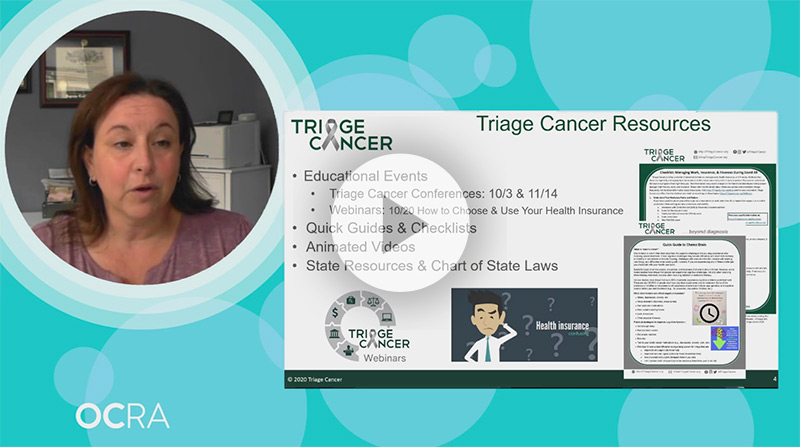The financial strain caused by treatment costs, missed work and other economic burdens is yet another major stressor that many ovarian cancer patients face. But there is help available!
Read on to learn more about financial resources, which were outlined and explained during the “Navigating the Financial Fallout from Cancer” panel at our virtual Ovarian Cancer National Conference. Panelists Emily Gibb of GSK, Kevin G. Knowles of AstraZeneca, Joanna Morales of Triage Cancer, and Bridget Toomey of University of Iowa Health Care shared details about cancer financial assistance and other resources, including pharmaceutical patient programs, wage protection, and help for cancer patients to pay bills.
Help for Cancer Patients to Pay for Medications
A range of medications may be prescribed as part of ovarian cancer treatment, which in turn may leave patients with expenses that can add up quickly. One source of cancer financial assistance comes from the drug manufacturers themselves, who have developed programs to help patients pay for their medicine.
Co-Pay Assistance Programs
Patients with commercial health insurance who need help with out-of-pocket treatment costs may find financial assistance via special co-pay programs.
In 2019, manufacturer cost-sharing assistance helped patients with more than $1,600 on average toward their out-of-pocket costs for oncology medicines, according to data from contract research organization IQVIA.
Many companies have special teams that will guide patients through their process, from investigating their current prescription coverage to helping with specialty pharmacy referrals.
Patient Assistance Programs
Financial help is also available for patients who are uninsured—or insured through Medicare—via patient assistance programs offered by numerous pharmaceutical companies. Those who meet certain income eligibility requirements may be eligible for charitable assistance to help cover their cancer drug costs.
As part of these services, many manufacturers will also connect patients to external resources, such as independent foundations and non-profits that can also help alleviate the economic burden of cancer treatments.
Contact Information and Resources
Detailed information about different manufacturers’ assistance programs for cancer patients can typically be accessed via dedicated websites. There are also general resource sites with information about various manufacturers and the programs they offer.
Additional Patient Access Programs
OCRA has compiled a listing of manufacturers who offer patient access programs.
Medicine Assistance Tool (MAT)
The MAT (medicine assistance tool) search engine offers information about different resources available through various patient assistance programs.
Help for Cancer Patients to Protect Wages
The cost of medication is just one of many factors that can stress a patient’s finances, as explained by Joanna Morales, Esq., CEO of the national nonprofit Triage Cancer, which provides education on practical and legal issues that may impact individuals coping with cancer and their caregivers.
“Financial toxicity is a relatively new term coined by some researchers from Duke back in 2013 that described the financial challenges that can come with a cancer diagnosis,” Morales noted. “But even though it’s a relatively new term, it’s not really a new problem. And part of the challenge in addressing financial toxicity is that there are so many contributors to it.”
One topic that she addressed is the potential for ovarian cancer patients to lose earnings when dealing with a cancer diagnosis—and ways in which they can still bring in some type of support while they are not working.
Family and Medical Leave Act
Many ovarian cancer patients—and their caregivers—are protected from losing their job under the Family and Medical Leave Act. This federal law allows eligible employees to miss up to 12 weeks of work due to their own serious health condition or to care for a family member with a serious health condition. The law provides that they can still receive group health benefits while they are on leave. It also protects their job, meaning they can return to the same position once they are ready to go back to work. However, this leave is unpaid.
Disability Insurance
Some employers may allow the use of sick days or vacation time all at once so that patients can still receive wages while on medical leave. And some businesses may even permit workers to donate their paid time off to a sick colleague. The primary way to replace earnings lost due to unpaid medical leave, however, is through disability insurance.
“You can buy policies directly from an insurance company. But most people get access to a private disability insurance policy as an employee benefit through their employer,” explained Morales. As such, she suggests that people double-check with their employer if they are unsure as to whether they have disability insurance.
Disability insurance is also available through the government, with a handful of states offering short-term plans and the federal government providing long-term programs such as Social Security Disability Insurance.
Contact Information and Additional Resources
Triage Cancer Information
Triage Cancer provides a comprehensive repository of educational materials and resources on practical and legal issues most important to navigating a cancer diagnosis:
- Family and Medical Leave Act
- State Leave Laws
- Disability Insurance
- Financial Impact of Cancer Diagnosis
Additional Insurance Resources
OCRA has compiled a listing of insurance resources, both for disability and health care insurance plans.
Help for Cancer Patients to Pay Health Care Bills
Another financial strain for ovarian cancer patients is the cost of visits to the hospital, doctor and other health care providers. The first tip for patients to keep in mind when dealing with health care bills is to not panic into paying whatever amount that’s listed as owed.
“If the amount on your bill that you get from your provider—so either the hospital or the physician’s office—seems too high, never just pay it,” said OCRA Advocate Leader Bridget Toomey, MS, CPC, Assistant Clinical Director for the department of OBGYN at University of Iowa Healthcare, one of the nation’s leading academic medical centers. Toomey advises patients to compare that statement with their EOB (Explanation of Benefits) that’s sent from their health insurance company. PR (Patient Responsibility) is the code on the EOB that states the specific amount that should be billed to the patient.
Appealing a Denial
If a denial is listed under the patient responsibility portion of the EOB, Toomey again cautions patients to thoroughly investigate before paying the bill. Her advice? “You should call the institution—the hospital, the physician, the provider’s office—and find out if they need anything from you. And then, if they don’t, ask them how you can get this claim paid.”
Many will be able to provide patients with the necessary documentation for the insurance company and some will even guide them through the appeal process itself. And though there are limitations on what exactly health care providers can appeal on behalf of a patient, Toomey notes that their staff are there to be of help. “Just call and ask,” she reiterated.
Additional Cancer Financial Assistance Resources
OCRA has compiled a list of organizations that help ovarian cancer patients with health care bills and other expenses.

Watch now: “Navigating Financial Fallout from Cancer,” and other informational videos originally presented at our 2020 virtual National Conference are now available in their entirety on our website. View all 2020 Ovarian Cancer National Conference videos.


